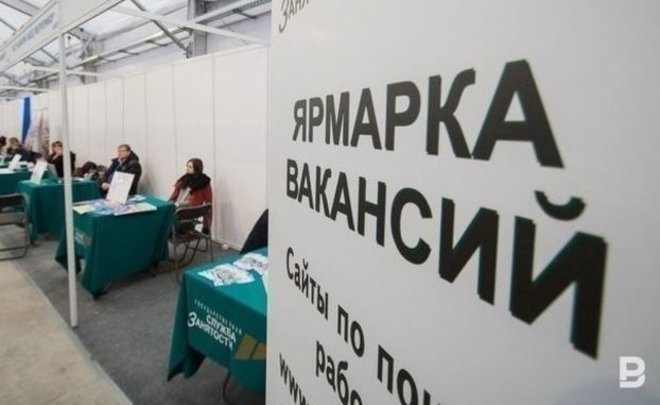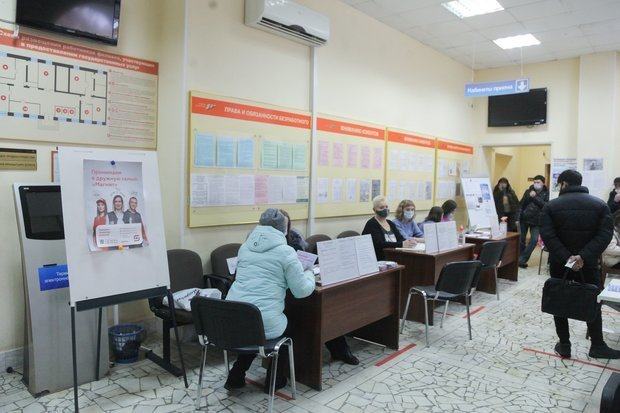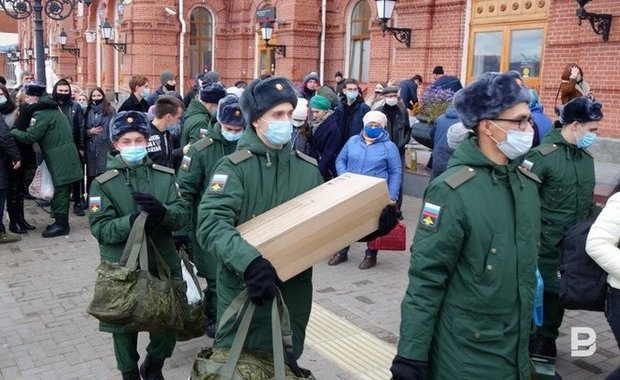How workers in Russia are lured with hollow promises of exemption from mobilisation
Employers and HR agencies are trying to take advantage of the exemption from mobilisation

There is a new trend in the Russian labour market — HR departments of enterprises and recruitment agencies are luring workers promising them to free them from the partial mobilisation. Besides the requirements for the job seeker, the salary and working conditions, job ads include the phrase “exemption from mobilisation provided” or ambiguous “Exemption.” Realnoe Vremya found out in what cases it is a real guarantee and when it is a public stunt.
Promised exemption
While the State Duma is considering a bill on cancelling the exemption from mobilisation for deputies and senators and the Russian Ministry of Sport is trying to get an exemption for football players, some employers are luring potential workers promising them an exemption that doesn’t yet exist. Many job ads now have a phrase saying that the employer provides those who will get hired an exemption.
Realnoe Vremya did an experiment: a correspondent picked tens of ads, called employers and recruitment agencies presenting to be a concerned mum of a potential mobilised man and specified how a mythical sergeant named Oleg who has a speciality that is in demand but doesn’t provide any guarantee would be given an exemption.
The “mummy” got disappointed because almost in half the cases a promise of exemption from the service is nothing but a banal trap and only very qualified specialists in certain areas can have an exemption — only if the related ministry and the Chief Staff confirm their indispensability in the rear.

“We will sign a contract and provide lists” or simple hide them in the garage
Here is the brightest example: an HR agency placed a position of an analyst offering remote work “from any part of the world” and promises that “Working with us you will be exempt from the mobilisation as a worker of an IT company.” An attempt of discussing what companies and how the exemption will be provided detected the manager’s absolute incompetence when it comes to the mobilisation — no clear answer to any question. After the fifth attempt — who exactly and how “my son Oleg” who wants to work remotely from a village will be provided an exemption, the correspondent didn’t want to hear “as soon as the contract is signed, the employer will send the documents to the commissariat or the Defence Ministry.”
A company “producing components for an enterprise implementing a state defence order” offered another questionable option. A qualified lathe operator was needed there. “Oleg” met all the criteria, however, in reply to the question if the enterprise can provide an exemption for this position they want to hire him so much, the HR manager started to say: “As soon as we establish labour relations, we will send a list of those who must be exempted to the commissariat.” It seems the woman understood that not citizens on the list are exempted but specific positions and specialists (consequently, not Oleg, Rustam or Ilgiz have an exemption but a lathe operator, mechanism and so on have.) She understood it because she needed to interest a potential employee.
“Oleg’s mum” had the most interesting dialogue with an author of a short job ad: “Welder needed. Stable salary. Exemption.” A man who answered the call turned out to be a private entrepreneur — an owner of a car repair shop in a garage. He voiced the salary, honestly said that nothing would be deduced from it... After “mum” got it, she modestly wondered: “How are you going to provide an exemption if it is unofficial?” He answered: “No commissariat will find him in my garage! It is not a factory with an HR department, military report and so on...” the employers explained the specifics of his personal exemption.
A manager of Marin Geo Resource HR agency in Udmurtia explained to the mum of the candidate for the position with an exemption from mobilisation that “The security service would check him first, then we buy him tickets during the hiring process and add an official letter saying that he is going to a defence facility on rotation.”
Krug HR agency explained that a mill operator is provided an exemption “while he works in the plant, and it is given after being hired, the position already has an exemption.”
A manager at Business Partner HR agency who looked for a specialist for a top manager in an accumulator making plant honestly admitted that she had been assured about a month ago in the enterprise that the exemption-related issue would be resolved during the month and she has yet no idea how things are there. In answer to the question if the enterprise was considered a defence company, she said “No”.
Under “protection” of Defence Ministry
An ad placed by the Ural Optic and Mechanical Plant (Yekaterinburg) looks more or less serious. The enterprise is looking for a polisher of optic parts in Kazan. It is unnecessary to explain why in Kazan — there is a chance of pouching experienced workers from the Kazan Optic and Mechanical Factory. A lot of bonuses are promised — from subsidies on food and a subscription to a gym to an exemption: “According to Clause 9 in the Russian President’s Order No. 647 as of 21.09.2022 On Declaration of Partial Mobilisation in the Russian Federation, workers of the Ural Optic and Mechanical Plant are entitled to an exemption from the military service via mobilisation.”
The Russian Defence Ministry’s Military and Construction Company also inspired confidence. It wants a road paver driver from Kazan for its branch near Moscow. It promises a train trip to the company, accommodation at the organisation’s expense, per diem and “the right to an exemption from the mobilisation during the work period.”
However, it turned out that that wasn’t so simple here either: the process of obtaining an exemption got complicated with the start of partial mobilisation in Russia.

Impossible to bring lists to the commissariat
“The military registration office of every enterprise deals with the exemption of workers, particularly, positions,” head of the Tatarstan Commissariat’s Department of Public Appeals Sergey Kotin explained the order to Realnoe Vemya. “The military registration office requests exemption for positions and specific workers who are on this post through related ministries. For instance, if the enterprise is related to the Ministry of Construction, this ministry draws up lists of companies it cannot do without if these companies do a public order.”
According to the representative of the commissariat, the list of positions and last names on these posts are approved by the Chief Staff of the Russian Federation, and only then they are sent to military commissariats in Russian regions.
“Only positions used to be exempted before the start of the partial mobilisation. And now not only the post but also a specific specialist is exempted,” he specified. “We send the lists of exempt workers to military commissariats of municipalities.”
Sergey Kotin noted that “the attempts of enterprises to come to military commissariats with lists are stopped”: “People don’t understand, they say: ‘We work for the defence industry, we will bring lists to the military commissariat and the commissariat will provide an exemption.’ But this won’t happen — it is illegal.”
Kotin didn’t name the real number of how many specialists in Kazan had been exempt — it is a military secret. He just noted: “We have an industrial city and there is quite a big number of those who have been exempt. But there aren’t many bank specialists and IT workers among them.”